Chris Coady is the engineer responsible for some of the most emblematic and critically acclaimed indie rock records of the early 21st century. Teaming up with producer David Sitek to build Stay Gold Studios in the early 2000s, he's worked with countless breakout artists and critics' darlings including: TV On The Radio, Blonde Redhead, Yeah Yeah Yeahs, !!!, Grizzly Bear, Architecture in Helsinki, Beach House, and many more. More recently, Coady has moved from New York to L.A., where he continues attracting artists who are looking to cultivate a distinctive and forward-looking sound. We spoke to him shortly before he made his final move west.
Even though you're a relatively young guy, you started out working on tape, and you're still surrounded by so much incredible analog gear in here. How much of a role does the computer play in the way you work these days?
Well, it plays more and more of a role. Once or twice a year I will try to do an album entirely on analog. But even when I try to do that, eventually somebody in the band will have an idea, and that idea is better than staying all on tape. In those cases, if we stayed on tape, we couldn't do what the band wanted, so we always embrace the idea. Once it ends up in Pro Tools, the album sort of takes control and starts steering things. And the computer makes it possible for someone with a wild imagination to turn those ideas into something real. When you stay on tape, there definitely is this magic when you hear a single, great, long performance. It's something I'd like to get more into this year, but I also love the computer. With the computer, you can make music that sounds like it has never been played — like you can't imagine it having ever been recorded in the real world, or played by a person. It's a sound that just exists. In a lot of ways, I think that's something magical. When you get these recordings that sound more analog and "true," it sounds just like a bunch of people in a recording studio. That's a different kind of magic. I feel like the computer is definitely useful for making things sound super natural. Also, it used to be that doing things on tape was the "punk" thing to do, and doing things on a digital machine, or the computer, was something for the more successful or pop-style groups. Now that digital is what's accessible for everyone, tape is what the rich bands use, and digital is now the punk thing. I do demonize the computer from time to time myself, because all you have to do is listen to the first verse of any song that was recorded in the '60s, '70s, or '80s, and there's this thing that's there. Then you listen to almost all music now, and that "thing" is kind of missing. I'm always asking how we can get it back. I don't want to say that it's impossible to make those kinds of ecstatic performances with masterful playing now, but it's far less common. The good thing is that I feel like when a band actually does perform that way, it's instantly heralded.
Weren't some of the first records of yours that really took off back in the early 2000's tape-based projects? I'm thinking of things like the Yeah Yeah Yeahs, TV On The Radio, and Blonde Redhead.
They were all tape-based, to some degree. With TV On The Radio's first two albums, both tape and Pro Tools were used, and the version of Pro Tools that existed back then was far more primitive than it is now. The Yeah Yeah Yeahs' first LP [Fever to Tell] was all tape. That one I had a bit less to do with. Their second LP [Show Your Bones] was both tape and Pro Tools. I'd say that the same working method that I have now is similar to what we were doing then, but tape machines are far harder to come by now. Every studio had a tape machine in the corner then, and right now we're sitting in a studio that doesn't have a tape machine at all.
One of the first records you mixed that got a lot of critical traction was Grizzly Bear's Yellow House. It's a pretty unusual and incredible sounding record. Their bass player, Chris Taylor, produced and recorded most of it himself. What was it like mixing a project where one of the band members is so invested on the production side?
By the time we started, Chris already knew what he wanted everything to sound like. It was a very quick mixing session, and he requested a tape mixdown, because he had recorded it all on his laptop. I think it was all done in less than a week. The very end of the session ended up just being playback sessions for all the different people who wanted to hear it. I think the reason things went so quickly was because Chris knew exactly what he wanted from everything. I think that it was his first album with the band, because the one before that was just [singer] Ed [Droste].
Chris told me that the approach he took on that record was much more "maximalist" than the way he goes about things now. He'd have a ton of tracks and instruments all playing the same line to get some of those textures. Had he done a lot of pre- mixing himself?
You know, there was some pre-mixing, but I think we deleted it all, pretty much immediately. These days, if there are plug-ins or automation on a track, I tend to leave it there; otherwise the first playback could be a shock for the band if they're missing things that they're used to hearing. But back then, my philosophy was "wipe everything out and start over." The basic mixing template that I start with on every mix today is almost exactly the same as it was then. Things are patched to the same point in the patchbay, and a lot of the equipment I use is the same. In fact, all of the bus send and return numbers on the routing matrix are the same. I would usually do my thing for a little while, then he'd take the board over. We traded off. I remember during that mix process there was a blizzard outside. We'd be working really intensely in the studio, and then we'd go out to listen to it in the car. When we went outside, there was snow on the ground, absorbing a lot of the sound, which made it dead silent. It was really easy to gain perspective by going outside into the silent, snowy street. Then we'd go in and come up with some notes. That was an exciting time. I ended up accidentally specializing in mixing albums with dense instrumentation from it! With that album, and some others I've mixed, there are sections with a hundred things happening at once. That takes a lot of patience. You have to listen at quiet and loud levels to make it so that you can hear everything. Maybe sometimes you can't hear everything, because there's so much — but it gives you an ecstatic feeling when all the elements are coming at you at once. It was definitely life-changing. When I worked with a band back then, it was usually my friends. Grizzly Bear were really just my friends from around the neighborhood who asked me to help out with their mix. But then it turned out to be a great album. It led to a lot of other mix work where a band had made their own album and stacked a lot of tracks on it. I'd be called in at the end to make sure that it would play back properly. It can be disorienting to mix something with so many elements, so I usually try to take out as many elements as possible and mix certain groups of tracks. Then, I add the others back and see if things become too chaotic.
Do you end up doing much subtraction in those kinds of mixes to make it work, or is the goal to make it all fit in somehow?
If someone gives me something to mix, I assume that it's all supposed to be there. I don't really make calls like that unless I work on a project with a band where, from the beginning, they tell me that if I have any ideas to let them know. If I'm producing an album, we have these kinds of discussions all the time about whether to subtract things, and we usually do. But if I'm mixing somebody else's album that they've recorded — and it just needs a good mixdown — then I assume that it's all going to be in there, unless they preface the mixing session by giving me creative input on that level. If something's really not working, and I'm doing them a favor by suggesting that we make some kind of a change, then I might do it if I feel comfortable with them and they feel comfortable with me. Otherwise, I just try to make it sound good with what they gave to me. A lot of times, I could be wrong. Unless something's really not sounding good at all, I just try to make it work.
In those cases, where you're handed something that's essentially a done project, what are you trying to bring out of the recording?
Well, I try to give it a big, exciting sound. I also try to make it completely in fashion — not in the sense of what is happening now, or this year, but what I predict people will want things to sound like next year. There are other mixers who have that kind of focus too. I notice it when I hear a track and wonder why the mixer would make it sound that way. It seems like other engineers and mixers will eventually catch up to the sound of those mixes. But, mostly, I try to make it sound like a big, exciting version of itself. I never really try to take things in a new direction. It's always the direction that already exists — just taking that and amplifying it. I also send lots of sounds through analog and tube equipment, and I also make a lot of judgment calls on what kind of signal paths to use. You can emphasize different elements of the music with just the input stage of an amplifier. As soon as the signal leaves Pro Tools, it hits an input amplifier. So I curate an array of input amplifiers, and input levels, that will inflate the signal in one way or another. The way that the harmonics react in the incoming signal is a big part of it. For certain mid- range melodies, I might use a Helios input amplifier. On other things, I'll use a tube input amplifier. They all come together within the desk, and then, as things need to stand out more, I'll send them out through equipment in parallel and blend them back in. I do lots of fader rides and fader automation to try to bring out a lot of the spirit of the song as well. If you just hit "play" on the song, you get one experience. But if you do the kind of automation where you're turning sections up and down, you get another kind of experience.
It's interesting to hear you talk about going for sounds that are slightly ahead of what's in fashion. You can hear that a lot on Grizzly Bear's Yellow House, and also on the first Beach House record [Teen Dream] you did.
When you want to make something like that, you want to remember the release date is going to be a year or so out from when you actually made the record. You almost forget what the album was by the time it's released — you've got this time delay. They say it's because they need to get in line for press and, of course, there can only be "one record of the month," so they like to time releases. So if you try to pursue whatever's in style right now, there's going to be a long wait before it comes out. That's why you always have to forecast what people might want from an album a year from now. I mean, it's not coming out for six months, at least. I also think that there's basically no way to intentionally make something sound old. Even when people make Adele or Amy Winehouse albums, where it's supposed to sound old, it also sounds very modern at the same time. I think that, in a way, it's impossible to make something sound the way that things did back then. It wasn't only culture and the way people played their instruments. Everything was different. Things worked differently. The electricity coming out of the wall was different. Trying to make things sound old is really more like just winking at something. When you're making inspired music, it's good to have inspirations, but that's really about just taking little bits here and there. The overall sound has always got to be the band's sound.
So if you're trying to emulate something that just came out, by the time your album comes out you'll be behind the curve? And if you try to make something sound exactly like an old band on purpose you're just screwed? [laughs]
Yeah. A lot of times when I'm talking on the phone with the band and setting up the session, I'll ask what the new album sounds like. They'll say, "Oh, yeah; it sounds like a cross between Suicide and Can." And then when I hear it, it doesn't sound anything like those bands! But in their minds, they're making an album that sounds like Suicide and Can. In reality, maybe it sounds exactly like The Stone Roses to you. And then, when you hear it in the end, all it really sounds like is the next album from that band. Maybe they're using a certain guitar pedal or drum machine that one of those other bands used, but that's really about it. People's concept of their own music is tricky. Everybody has some kind of distortion of their own self-perspective, and that's especially true for musicians when they're talking about their own music. No one really knows what their own music is. I think that if people did, it wouldn't really be as good. By embracing those elements, and trying to make something new, it always just ends up sounding like the band's next record. There are certain phases that bands go through too. If they make a really cluttered album, the next time they might make one that's sparser. A lot of bands, like The Beatles or Led Zeppelin, have done their first album one way, the second album a little more the other way, then their third is more acoustic sounding, and on the fourth album they introduce the keyboard or something. [laughs]
Grizzly Bear is actually a prime example of that as well. After finishing Yellow House they changed their approach a bit and started to get sparser. Beach House, on the other hand, made two records with you in a row, and the second one [Bloom] sounds like a better version of the first. Do you ever have people coming back to you who want to try something completely different the second time around, or do you usually find they just move on, if that's the goal?
Sure. I've been recording bands since I was a teenager, so many times people will work with me on one album and then somebody else on the next album. If I were in a band, I'd use a different producer on every album too, because I'd want to try new things. I think people tend to stay more loyal to an engineer or a mixer in hip-hop. They're going to stay with that mixer because they don't know why they wouldn't. When Beach House called me for the second album that we did together, I don't think it was a matter of, "Let's do the same thing again." I think they just went, "Okay, it's album time again." And I said, "Okay, cool. Let's do it." Beach House is very hands-on during the mixing process. When a mix gets done and I give it to them, they sit down and literally listen to every half-second and think about it. They have very extensive notes. I think, if there is any overlap in sonics between those two albums, it has a lot to do with them, their instruments, and their musical sensibilities, which I think grew a lot from that album to the next. But during the mix, they take the mix into another room, talk a lot about it, and come back with a very specific list of notes. I think that, if there are any similarities, it probably has to do more with them and what they wanted out of it.
Although you've worked on all these very different-sounding albums, you mentioned that you have a template you developed as a default way of beginning a mix. How did that come together, and is it something that feels more freeing than constraining to you?
When I moved to New York, I bounced around from job to job. I worked at a TV commercial place, a synthesizer store for a while, and I ended up becoming a tech at Quad Recording Studios in midtown. Because it was right after 9/11, there wasn't a lot of business, and my salary was pretty low for the kind of work that I was doing. But to sweeten the deal, they gave me full access to any room that was open for me to do my own projects in. All the bands I was working with were often in these lousy basement studios and, all of a sudden, I had free reign over these world-class rooms. They had these giant SSL consoles, two 24-track machines, tons of equipment, lots of mics, and big rooms. The biggest, and most consistent, client was mixer Michael Brauer [Tape Op #37]. He had a system of mixing that made absolutely no sense to me the first time I saw it. I knew that it looked awesome, because he had lots of amazing equipment I'd never seen before, and I saw how he was able to mix a song from top to bottom in four hours that would have taken me four days. I started talking to him. I'd come down to do his tape alignments every day at 9 a.m., bring a coffee, and we'd sit and talk for maybe 30 minutes every morning. Then I'd leave, and he'd start his day. I remember asking him, "Why do you always have this one compressor on this group send button?" He'd say, "Well, if I find myself going for that sound on a regular basis, and I end up patching that compressor in on that channel every day, why waste time patching it in each time? Why not just leave it there so I can have an option of pressing a button to make it appear?" His approach changed my view of what a workflow should be. I think it changed everybody's. People don't realize that a lot of their own workflow is inspired by this guy. It was a paradigm shift. I think he was the main American mixer doing things this way. When I started getting my first outboard equipment, I would put it on an insert and move the insert cables around. But, eventually, I learned that I could put it on a bus, and then if I wanted to send any channel to that bus, I could just press a button. It took a lot of the patching out of the mixing process, because all the patching was already done.
So the setup can pretty much stay that way for an entire album? Or even from one project to another?
Yeah. I'll pull up a different pair of EQs on different channels, and in Pro Tools, if I want a guitar to have an API EQ, I'll run it through channels 13 and 14, because that's where the API lives. Then, if I want it to go to the Helios instead, I'll run it through channels 17 and 18. That way, when you're splitting things out onto the board, you don't do it arbitrarily. The idea of taking a compressor and putting it where you would normally put an echo as a send/return is something that I learned from working as [Brauer]'s tape alignment tech. A lot of the equipment that I had that was really working, in that sense, I held on to. That's why the Federal [compressor] has always stayed on group five. It's not like a straightjacket at all, because if I don't like the sound of the Federal on the bass, then I take the bass out of five out and put it in six, and then it's going to another compressor. If that's not working, I press the button for bus seven. You can quickly audition effects and compression, without having to walk out of the speaker range to go to the patchbay and back.
You started as a musician yourself. How did you get wrapped up in the technological side?
In the '90s I was in bands; there was a really big music scene in Baltimore and DC. I got my friends together, and we had a band. We didn't make any good songs, but there were always bands that I was close with who were incredibly good. I feel like now if I had a band it would be pretty good, because I have a better idea of what a band should be. But when I was a teenager, we were just trying to be like Fugazi [Tape Op #12] or something. I worked at a music store in DC called Chuck Levin's [Washington Music Center], and the Alesis ADAT had come out. Everybody wanted one! This was in the '90s, so to make room for the Alesis ADATs in the warehouse they were liquidating all the old tape machines at blowout prices. I told my boss that I really wanted one of them, and I asked him if I could work it off. He was happy to get it off the floor, so I got an 8- track tape machine.
That's funny. So, at this time, tape machines were the punk rock thing, and ADATs were really high-class?
Yeah. I mean we all had a really negative opinion about ADATs. But actually, now I think they're kind of cool. I got a tape machine, a mixing board, and an echo machine. I lived in a loft in Baltimore, so I opened up for business at $10 an hour and recorded all of my friends' bands. There were bands that would come through on tours and stay with us. My roommate, when I first moved to New York, ended up being [producer] Dave Sitek, who also had a studio back in Baltimore. We had slightly rival studios, and we had lots of experience with one another. When I moved to New York I didn't have a very good job, and I was having a hard time making my way here. Dave let me move into his loft and gave me a good deal. Then he was like, "Oh, I want to produce the Yeah Yeah Yeahs." At that time, it was this band that had just started. So we worked together on Yeah Yeah Yeahs and TV On The Radio. He opened a studio, called Stay Gold, but he had me get it together and run it. Then, when TV On The Radio went on tour, it basically became my studio to record in. One after the other, I recorded TV On The Radio, the Yeah Yeah Yeahs, Grizzly Bear, Gang Gang Dance, and Blonde Redhead; literally all in a row, with no days off. That was, like, the entire years of 2005 and 2006. It was this really intensive time of recording all these bands. The studio was pretty cheap.
Were pretty much all those bands, except the Yeah Yeah Yeahs, fairly well established by that point?
That was TV On The Radio's third release, so by that point they were pretty established. Blonde Redhead was very established. Grizzly Bear was the least established band out of all of them, but a lot of people were talking about them. I felt like I was in the right place, at the right time.
How did you deal with the pressure of knowing that each of those records was going to have some pretty serious expectations?
I thought I was a lot better than I probably was at the time! [laughs] Now, I feel like I know my own limitations. It wasn't that long ago, but nine or ten years ago, when I was just starting out, I thought I was the best. Also, there just wasn't enough time to stop, think, and feel paranoid about whether it was going to be good enough! I was working with great bands, which helps. We felt excitement in the studio every day when we heard things back. I just wasn't that worried about it, and I also didn't think about it as something that was going to be "good for my career." I just wanted to hang out with cool people and work in the studio. All those things in a row like that seemed very normal. It's actually still the way that things are for me.
As it should be. I mean, that's the goal right? To keep on working on great records, back to back?
Yeah. The way things are different now is that all of those bands were either friends, or friends of friends. A lot of the bands I work with now are strangers. By the end of the album we're usually pretty good friends, but I'm definitely walking into more situations where I don't know what the band is like yet. I learn who they are while we're making the album. That feels unnatural to me, in a way — because I'm a shy person around new people. But we've all got a common goal from the second we enter the studio, and I usually just start working and meet them along the way. By the time we're off the ground with the recording, I've gotten a real sense of who they are.
Sure. You're all on the same team, so you've got that going for you!
Yeah. I'd say that there's almost never a time where I want something that they don't want. We're almost always on the same page. The client I'm working with right now is remote, and the song I'm working on has a very small track count, so we're ahead of schedule. Today is a pretty relaxed day.
Obviously, the gear is more accessible than ever these days. Having been a $10 an hour kind of guy, once upon a time, how do you feel about the $10 an hour crowd these days? Some engineers will complain that too much cheap competition devalues the craft.
Nah, I love those guys. I don't think about it like that. The way I feel about competition is like this: The way I do things, there's nobody that does it better. But the way that the next guy does it, I can't do that. I could never emulate another producer's style, because I'd never be as good at it as they are. I'm not worried about competition, in that way. I'm also not worried about anyone undercutting me and messing with my market value or something, because those kinds of people always exist. First of all, everyone does it at one point, because you need to build a portfolio. It's a tradition that's as old as time. You cannot learn how to record, produce, and mix from a book, or anything like that. You've got to do it every day, and you need bands to work with. The reason that I really appreciate those guys for existing is that a lot of the music I listen to is not big-budget music. When I'm at home, I usually listen to very avant-garde, noisy, low-budget recordings. I don't know why that is. It's not what I seek out, but it's a lot of the groups I end up listening to at home — bands that don't have any money. So the $10 an hour recording person is going to be someone who is recording music that's culturally very important. There's no band that's considering working with me as a producer and also considering a $10 an hour guy or gal. They're two different things. I also think that, because these people don't have as many resources at their disposal, they do all kinds of awesome, creative things. The richest bands are not necessarily the best bands!
There are some mixers who even leave lot of the settings on the gear in one place, and if they want a different sound, they just go to a different piece of gear, rather than fiddling around with knobs. That's not Brauer so much maybe, but more Lord-Alge who never really changes the knobs on his gear. Do you go to that extent with it?
Well, I feel like he has enough equipment, and his sound is uniform enough that it works for him. When someone hires me as a mixer, I think they appreciate my highs, mids, and lows, but they want to sound like them. I feel like when a person hires Chris Lord-Alge, they want to sound like Chris Lord-Alge. I respect that, because those sounds are very impressive, and it sounds great on the radio. But for me, I have to change the knobs, because I have to put things to the setting that suits the band and the album more than he does. That said, there are things that I have defaults on. The Compex stays the same all year, and the EAR compressor, the only two settings I'll use are two different release timings.
Is that like a Fairchild kind of compressor, the EAR?
Yeah.
Are those pretty similar to the first and second release settings on an original Fairchild? Because those are pretty much the only settings anyone uses on them, I think!
Yeah. That's release settings one and two. The timing is the same. The sound quality is very different than the actual Fairchild though.
Interesting. How so?
On a Fairchild 660, when the needle goes down you get a squishiness and texture that's added. With the Esoteric Audio Research model, as the needle goes down the sound stays very much the same as it was. It makes it less of an "effect", like an original Fairchild, but far more useful. It's definitely one of the best compressors ever made. But it's funny. Although it's a highly sought-after compressors that does what it does better than anything else, this little Retro [500 series] Doublewide Compressor over here is probably my favorite I think. I get a lot more use out of that than anything else.
What do you find yourself using it on?
Vocals, bass, guitars, percussion. It's got two different sets of timing. You've got your single and then your double, which speeds up the response. It does something nice with the midrange, makes things sound compact and fit together. With all these tube compressors, a lot of them are very valuable and sought-after, but this thing is fairly inexpensive for a tube compressor, and it does what I've always wanted a lot of these nicer ones to do.
I've always loved the Sta-Levels they're modeled after. They do something more than compression. The whole mid- range shape of the sound changes. I like that word you used, "compact."
I was reading an interview with [Sylvia Massy], the engineer for [one of] Rick Rubin's Johnny Cash albums, [Unchained], and I think that vocal is the Sta-Level. Those vocals sound amazing, like an unforgettable vocal sound. Of course, a lot of that has to do with him, but the compressor they were using was a Sta-Level. Whenever I think about what a Sta- Level sounds like, I always think of that recording. I think it's pretty accurate.
I know what you mean. So what are some of your other defaults on the different busses, and what do you seek to get out of them?
A lot of it is just having good gain staging. I take a certain instrument and put it through different gain stage treatments. Instead of having one compressor compress by 12 dB, I'll put it through a couple different compressors that are each doing less. I feel like when each stage is doing less, you can get more of an effect and a stronger sound. It seems backward, because if you're running something through a lot of different amplifiers, you'd think that would weaken the sound, but it doesn't. Once the signal comes out of Pro Tools, it might hit a piece of gear, then hit the desk, then hit another piece of gear on the insert if it needs it, and then it hits the channel fader, and then I have a post-channel small fader that sends it to a routing matrix with every piece of equipment in this room tied to it. Then, they return on yet another set of small faders. I think that's common when you use an in-line console with two sets of faders and you need to return things. It's really about different gain stages with different properties, and engaging and disengaging them in different sequences.
So it's not always just about the way a certain box compresses, or what frequency notches you're trying to hit with an EQ, but also the fact that they add harmonic distortion or alter the tone in some other way that you're looking for?
Yeah. If it's like one instrument going a compressor on one of the sends, there might be a stereo compressor with an EQ right behind it. That EQ stays on the same setting all year round. Usually, it is making up for the gain reduction that compressor does on the high end or low end. If I'm sending one instrument to it, I've often got one hand on the small fader that's sending to it, and one on the small fader that's the return. I'm changing the level to find the harmonic distortion that suits the sound the most.
How about your outboard EQs? You mentioned that you might send more than one track to a single EQ, like the Helios.
Yeah, but usually it's several tracks of one performance. It might be multiple mics on a guitar amp, but I tend to not blend too many instruments through one EQ. Usually it's the guitar or the bass. I do have sets of faders that are set up for "miscellaneous", and those usually have no insert on them whatsoever. The point of those is that on a 32 or 48 channel board, I'm getting some songs that have 200 tracks. Things absolutely have to be summed inside. The first 24 faders are dedicated to things that are major key players in the song. I try to give each drum its own fader, the overheads a stereo pair of faders, and stuff like that. I try to give key components of the song their own equalizers and channels so that they can have a more pronounced voice.
Do you ever find it useful to listen to references when you're mixing? Do you take a break to compare the recording to other things, or do you feel that it's better to go without any input from the outside at that stage?
I occasionally will do it if people insist on listening to a particular song, but I don't ever listen to something else for mixing inspiration. I already have a thing in mind usually within the first fifteen minutes that I'm just trying to achieve. In order to get to the finish line with a mix, there are like a thousand tasks you need to do. I'm just trying to get those tasks done. The highs, mids, lows, the way the vocal sits, the way the guitars are cutting through-and if its electronic music, the way that everything is operating together-these are things where I've already made up my mind on how it's going to be. Once I've gotten it to that point, I will often turn the whole thing over to the band, and they can kind of take over the mixing if they want to. They can make adjustments so that it suits them more. Some people really like the initial mix and just want to use that. I'd say the majority of people do. But then there are also lots of people who really want to get their hands into it. Some people have very long notes and might want to listen to some other song for reference. But I would say that I tend to not use any references while mixing. It's too easy to get paranoid and disheartened that way, so I kind of just keep trying to move forward and get things to a point where it's really strong before confusing myself with any outside music.
When you say "get their hands in it" do you mean that literally, like the band is up there adjusting things and doing fader rides with you?
I meant that more figuratively, really-although that does happen every once in a while too. The mix is definitely a house of cards the way everything is set up, so it's usually more about responding to their notes. If people want to have input into the mix, they shouldn't have to learn how to use the mixing board and figure out all the routing.
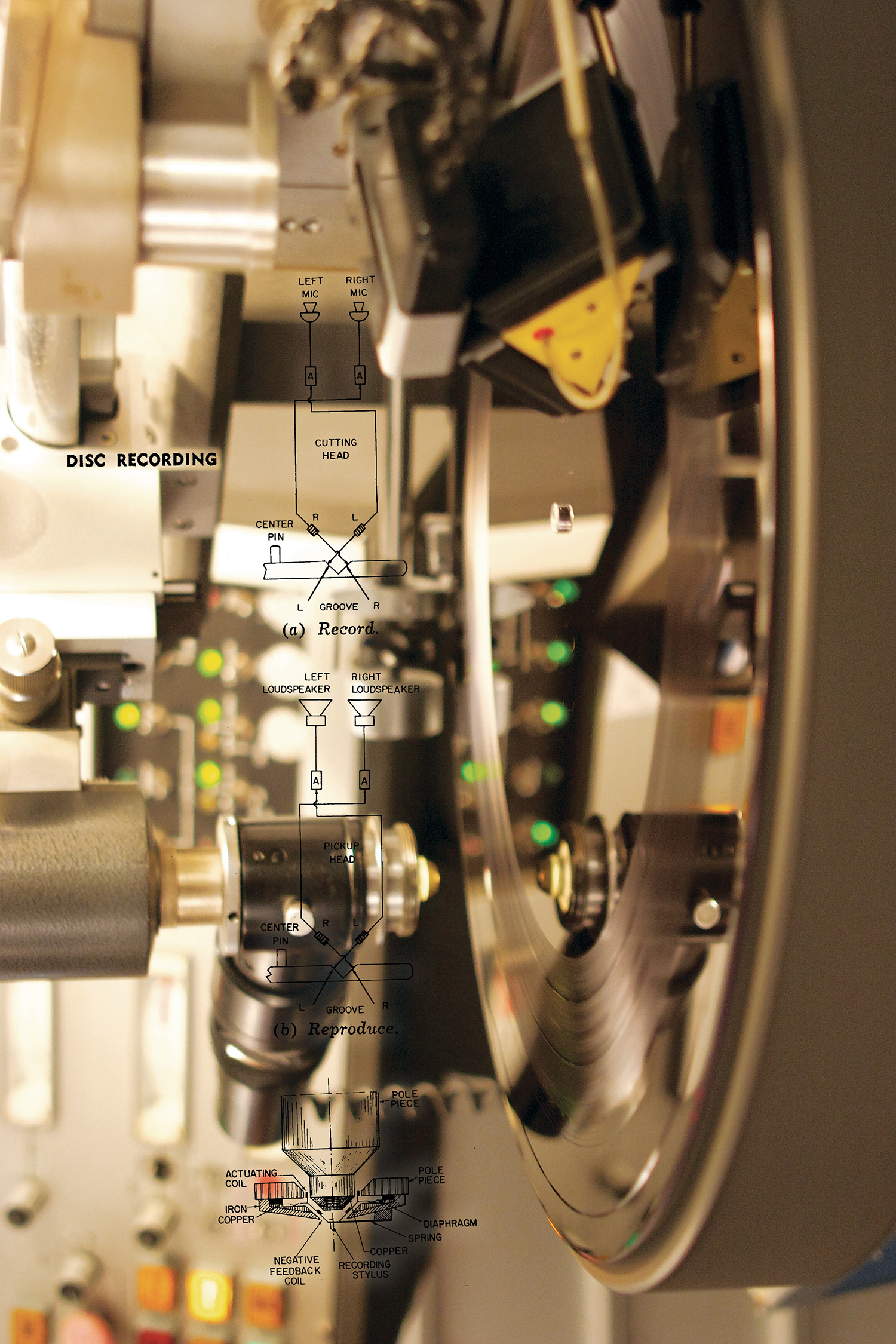

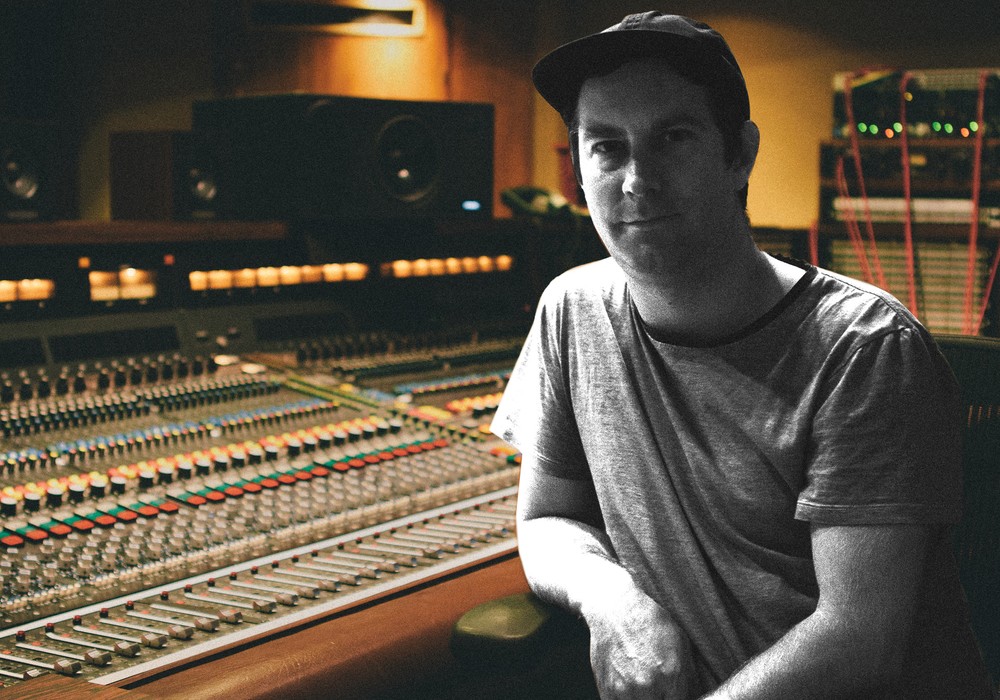
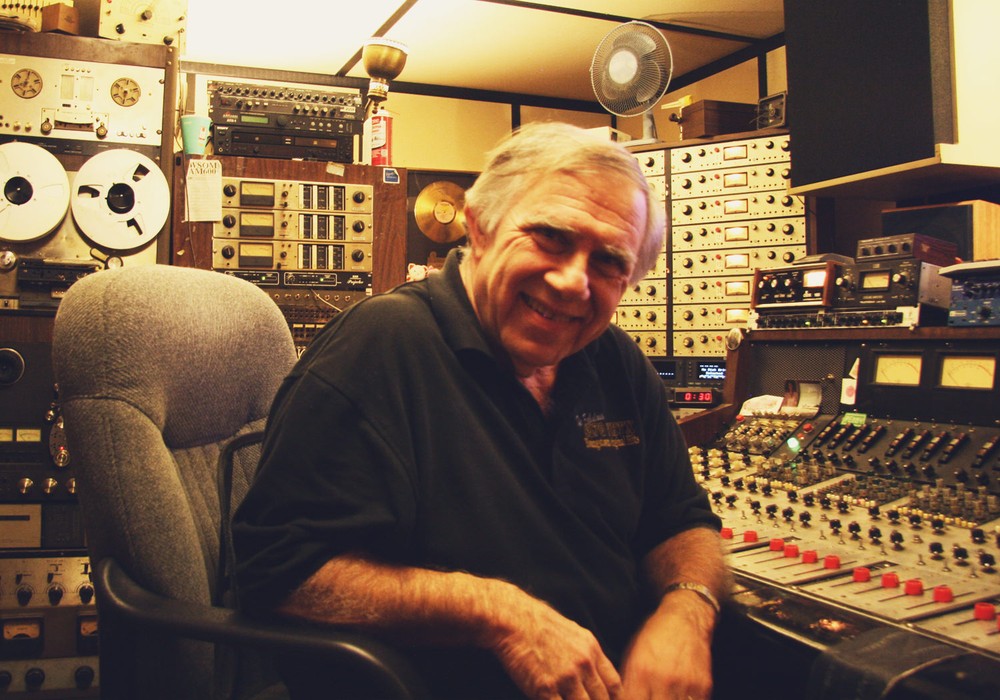
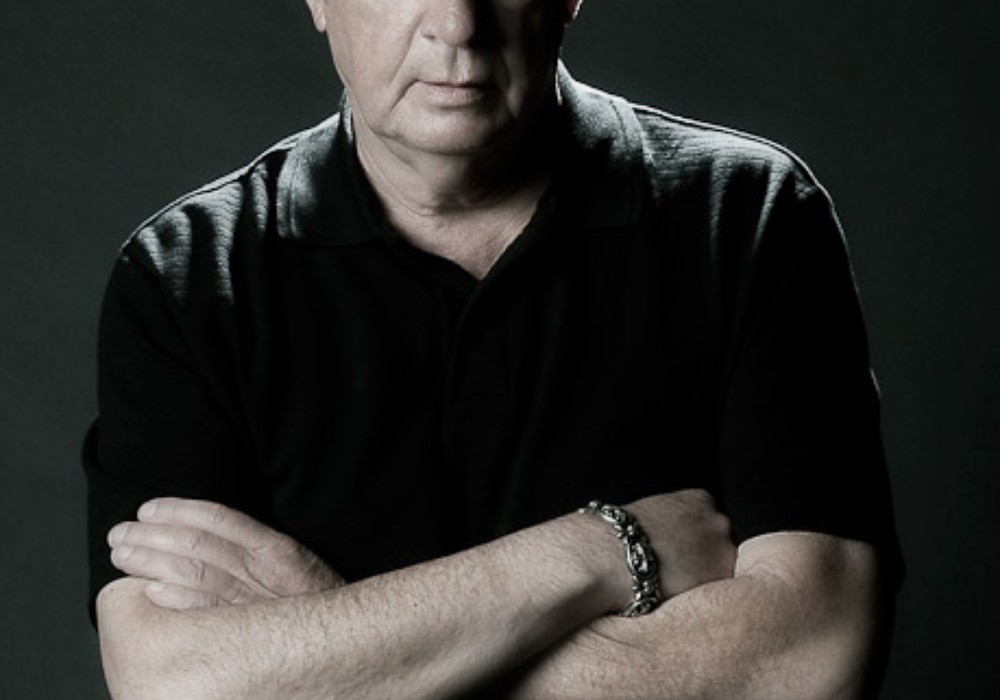
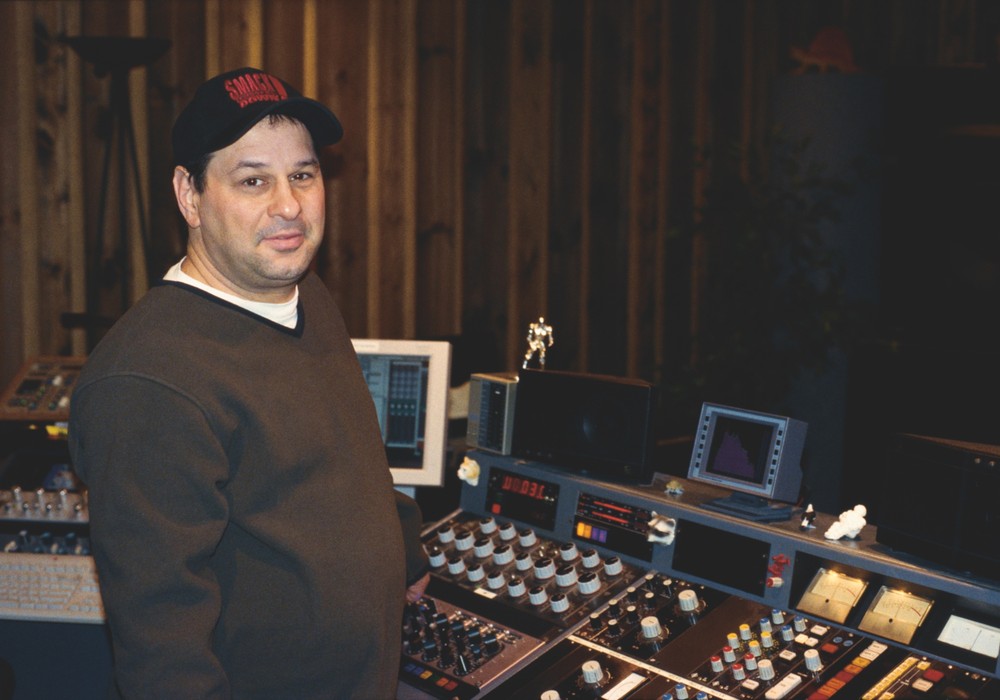
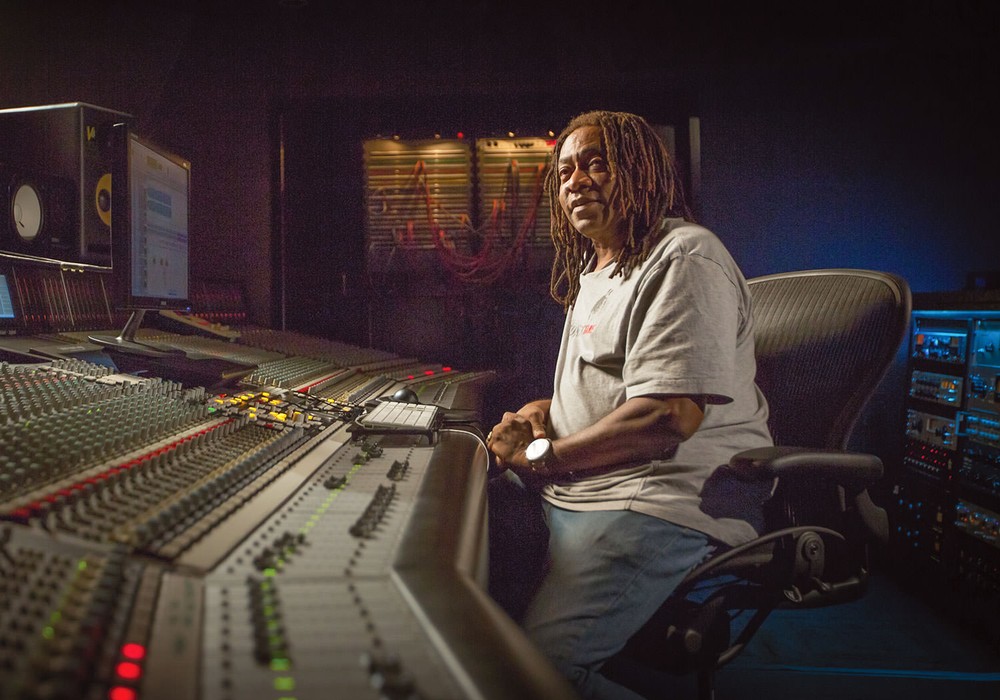

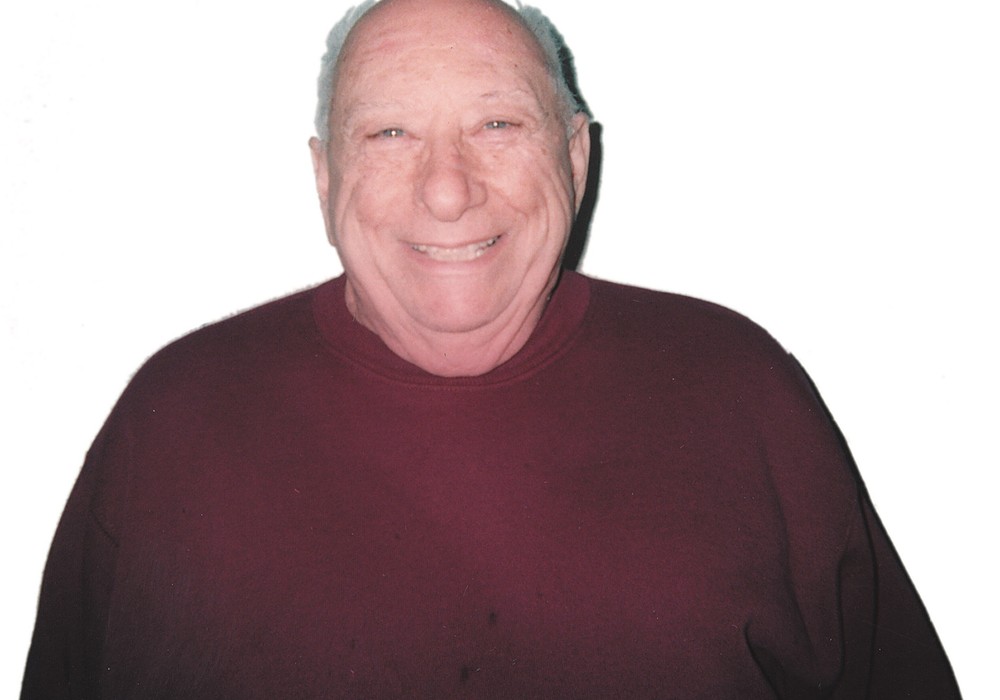
_display_horizontal.jpeg)